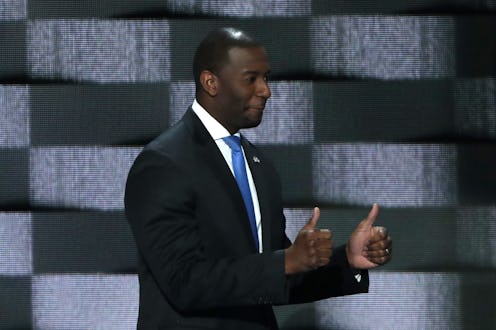News
Tallahassee's Mayor Is A Step Closer To Becoming Florida's First-Ever Black Governor

The state of Florida had a primary on Tuesday and one of its victors could end up making history. Tallahassee Mayor Andrew Gillum could become Florida's first black governor should he secure victory in the general election in November. He will face Republican nominee Ron DeSantis in the state's gubernatorial race.
Gillum has been mayor of Tallahassee, Florida's capital, since 2014. As Vox described, he is a progressive candidate, advocating for a single payer health care system, a $15 minimum wage, and increased educational funding facilitated by raising corporate tax rates. He is the first-ever black Democratic gubernatorial candidate in Florida's history.
Following his victory on Tuesday evening, Gillum took to Twitter to thank his supporters, writing:
Tonight, we proved what's possible when people come together & show up to build FL into a better state for all. I'm truly honored to represent people across the state as the Democratic nominee -- and I promise to stand up for everyday Floridians and the issues that matter most.
According to Time, Gillum's victory was perceived as an upset by many, as he defeated several more well-funded, establishment Democratic candidates in Tuesday's race. For example, as Vox noted, Gwen Graham, who finished second, is a former member of Congress and comes from a family with strong political ties. She had largely been perceived as the frontrunner in the Democratic primary. Gillum won Tuesday's race with 34 percent of the vote, while Graham secured 31 percent. Philip Levine, a former mayor of Miami, finish third.
On the Republican side, DeSantis, a representative from Florida's sixth district, defeated Agriculture Commissioner Adam Putnam by a significant margin. DeSantis has been strongly supported by President Trump, who has endorsed the candidate several times. Following DeSantis' victory on Tuesday, Trump tweeted, "Such a fantastic win for Ron DeSantis and the people of the Great State of Florida. Ron will be a fantastic Governor. On to November!"
As the New York Times described, Gillum's and DeSantis' respective victories mean November's gubernatorial race will be quite the face-off, as the two men have vastly different political leanings. Gillum made it clear that he considers his campaign a counter to the Trump administration, with the paper reporting that he characterized the White House as perpetuating division. As Gillum told his supporters in Florida's capital:
We’re going to make clear to the rest of the world that the dark days that we’ve been under, coming out of Washington, that the derision and the division that has been coming out of our White House, that right here in the state of Florida we are going to remind this nation of what is truly the American way.
In addition to taking on traditional gubernatorial roles and responsibilities, the victorious candidate will also be heavily involved in Florida's redistricting process after the 2020 Census, as Ballotpedia reported. Florida's governor has veto power over legislative district map proposals. Electoral maps have significant implications for Congressional elections, meaning the governor's decisions related to redistricting could have widespread implications for many years.
Florida's gubernatorial election will take place on Nov. 6, 2018. The candidate who wins will replace current Republican governor Rick Scott, who cannot seek re-election due to term limits.